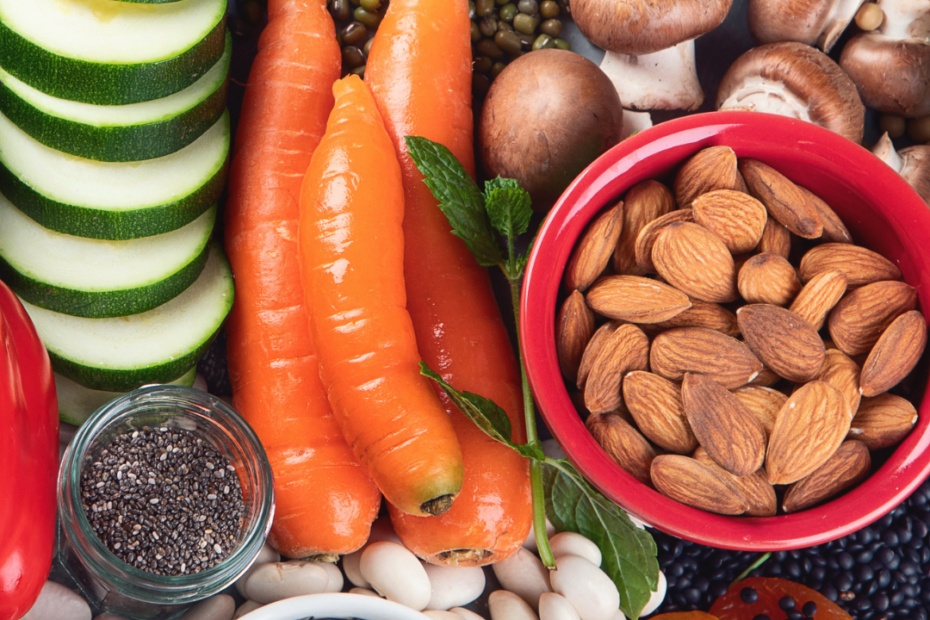Plant based eating has become extremely popular over the years. This way of eating appeals to people for a variety of reasons, including ethical, personal, and religious viewpoints. If you’ve ever considered adopting a plant-based diet, here is a beginner’s resource.
Plant based diets are often considered to be vegetarian with emphasis on beans, peas, fruits, vegetables whole grains, soy, nuts, and seeds. A plant-based diet provides many health benefits due to the nature of the food choices which are lower in cholesterol and lower in saturated fat. Eating a plant-based diet can help reduce the risk of heart disease, high blood pressure, high cholesterol, and type 2 diabetes. Research also shows that individuals who follow plant-based diets tend to eat fewer calories, weigh less, and have a lower body mass index (a measure of body fat) than their meat-eating counterparts.
There are several types of plant-based diets:
• Flexitarian or Semi-vegetarian: A person who eats predominantly plant based diet but includes some animal products
• Lacto-ovo-vegetarian: a person who eats dairy products and eggs
• Ovo-vegetarian: a person whose diet includes eggs
• Pesco Vegetarian: A person whose diet includes fish
• Lacto-vegetarian: a person whose diet includes dairy products
• Vegan: a person who consumes no animal products whatsoever
Some of concern that arises when considering adopting a plant-based diet is if this way of eating provides all the essential nutrients the body needs. The answer is YES! A balanced, plant-based diet can provide all the nutrients needed to thrive and be healthy. The Academy of Nutrition and Dietetics (AND) states in its position paper on vegetarian diets that “appropriately planned vegetarian, including vegan diets are healthful, nutritionally adequate, and may provide health benefits for the prevention and treatment of certain diseases.” In addition, the academy states that “These diets are appropriate for all stages of the life cycle, including pregnancy, lactation, infancy, childhood, adolescence, older adulthood, and for athletes.” The following are frequent questions that surround plant-based eating:
How do I get enough protein without eating animal products? Protein can be found in most plant foods, yes that even includes fruits and vegetables. In the past, there was emphasis on food combining in one meal to make a complete protein, such as pairing rice with beans, but this is no longer necessary. The body derives all the necessary amino acids that it needs from foods consumed over the course of time, even when those foods are eaten separately at different meals. Daily protein requirements can be met easily by adding beans, lentils, nuts, nut butter, seeds, quinoa, and soy products such as tempeh and tofu to meals.
Can the body get all the essential nutrients in a vegan diet? If you choose a variety of foods, a plant-based diet can provide all the essential nutrients. However, if you adopt a vegan diet, where all animal products are excluded (i.e., eggs, milk, cheese) you’ll need to look for foods fortified with Vitamin B12 or take a supplement.
How can I meet my calcium requirements if I consume eat dairy products? Calcium is found in a variety of plant-based foods. Good sources include almonds, green leafy vegetables such as kale, Swiss chard and beet greens, oranges, white beans, kidney beans, lentils, broccoli, tofu, and okra. There are also many non-dairy foods that are fortified with calcium, such as orange juice, whole grain cereals and oatmeal. In addition, most plant-based milk alternatives like almond milk, oat milk and soy milk are fortified with calcium as well.
Will a plant-based diet provide enough energy to get through the day or to train hard? A plant-based diet based on whole grains, nuts, seeds, fruits, vegetables, soy, and beans will help provide sustained energy while avoiding the peaks and valleys of blood sugar dips throughout the day. A plant-based diet is high fiber, which provides bulk and helps to feel fuller longer. Many professional athletes are vegetarian, or vegan. Former NBA power forward, John Salley, former NFL tight end, Tony Gonzalez, tennis great, Martina Navratilova, Olympic track star, Carl Lewis and 6 Time Ironman World Champion, Dave Scott all eat plant-based diets.
What other nutrients should I focus on? A balanced plant-based diet should include iron, zinc, omega 3 fatty acids, vitamin C and as previously mentioned, vitamin B12.
Content submitted by Janyce Gately MS, RD, LDN, CHC
